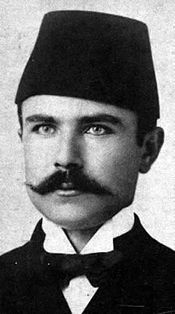Faris al-Khoury
| Faris al-Khoury فارس الخوري |
|
|---|---|
 |
|
| Prime Minister of Syria | |
|
In office October 14, 1944 – October 1, 1945 |
|
| President | Shukri al-Quwatli |
| Preceded by | Saadallah al-Jabiri |
| Succeeded by | Saadallah al-Jabiri |
|
In office November 3, 1954 – February 13, 1955 |
|
| President | Hashim al-Atassi |
| Preceded by | Said al-Ghazzi |
| Succeeded by | Sabri al-Assali |
| Speaker of the Parliament of Syria | |
|
In office November 21, 1938 – July 8, 1939 |
|
| Preceded by | Hashim al-Atassi |
| Succeeded by | Faris al-Khoury |
|
In office August 17, 1943 – October 17, 1944 |
|
| Preceded by | Faris al-Khoury |
| Succeeded by | Saadallah al-Jabiri |
|
In office September 16, 1945 – October 22, 1946 |
|
| Preceded by | Saadallah al-Jabiri |
| Succeeded by | Faris al-Khoury |
|
In office September 27, 1947 – March 31, 1949 |
|
| Preceded by | Faris al-Khoury |
| Succeeded by | Rushdie Kikhia |
| 1st Permanent Representative of Syria to the United Nations | |
|
In office 1946–1948 |
|
| Preceded by | office established |
| Succeeded by | Farid Zeineddine |
| Personal details | |
| Born |
November 20, 1877 Kfeir, Hasbaya, Ottoman Syria (present day Lebanon) |
| Died | January 2, 1962 (aged 84) Damascus, Syria |
| Political party | National Bloc |
| Spouse(s) | Asma'a Gabriel Eid |
| Relatives |
Suhail al-Khoury, son Colette Khoury, granddaughter |
| Religion | Christian |
Faris al-Khoury (Arabic: فارس الخوري) (1877–1962) was a Syrian statesman, minister, Prime Minister, speaker of Parliament, and Godfather of modern Syrian politics; born in Hasbaya in today's modern Lebanon. Faris Khoury went on to become Prime minister of Syria from October 14, 1944 to October 1, 1945 and from October 1954 to February 13, 1955. Khoury's ascension to the upper echelons of Syrian politics is remarkable, in light of the fact that he was Christian. Faris Koury's position as Prime Minister is, till this day, the highest political position a Syrian Christian has ever reached. Khoury's electoral popularity was due in part to his staunch secularist and nationalist policies. As a die-hard Syrian nationalist, Khoury never compromised on his principles and was resolutely against pan-Arabism and the ill-fated union between Syria and Egypt. Khoury opposed the short-lived union between Nasser's Egypt and republican Syria, the United Arab Republic. Through it all Faris Khoury served his country for almost 50 years. He was the grandfather of noted Syrian novelist Colette Khoury.
Faris Khoury was born in Kfeir in the Hasbaya District to a Greek Orthodox Christian family that eventually converted to Presbyterianism. Faris studied at the American University of Beirut, at the time called Syrian Protestant College. He started his career as an instructor at AUB and became involved in al-Fatat, the leading anti-Ottoman movement, after its creation in Paris in 1911. Khoury became the Christian member of the Ottoman Parliament representing Damascus in 1908. In 1916, Khoury joined the Arab resistance and promised to support the Arab Revolt, launched from Mecca by Sharif Husayn. His connections with Husayn, the prime nationalist of his era, resulted in his arrest and trial by a military tribunal in Aley. After King Faisal's arrival and liberation of Syria, Khoury pledged allegiance to King Faisal, the newly proclaimed King of Syria, by the Syrian peoples. In September 18, 1918 Khoury created a preliminary government with a group of notables in Damascus, spearheaded by Prince Sa’id al-Jaza’iri. Khoury then became minister of Finance in the new Syrian cabinet of Prime Minister Rida Pasha al-Rikabi. His post was renewed by Prime Minister Hashim al-Atassi in May 1920. He held this position until King Faisal was dethroned and the French Colonial forces imposed their mandate on Syria in July 1920. Khoury laid the groundwork for the Syrian Ministry of Finance, created its infrastructure, distributed its administrative duties, formulated its laws, and handpicked its staff. In 1923, he helped found Damascus University and along with a group of veteran educators, translated its entire curriculum from Ottoman Turkish into Arabic.
...
Wikipedia
